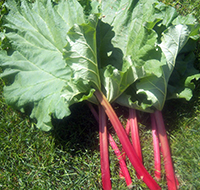Rhubarb
Avoid Rhubarb Can Cause Acute Kidney Injury
Rhubarb can cause acute kidney injury as such it should be avoided with both PKD and PLD. Rhubarb leaves should not be consumed since they are poisonous. The plant contains high levels of oxalic acid, and rhubarb consumption can markedly increase oxalic acid levels in the urine.
Overdose
Signs of overdosage include vertigo, nausea and vomiting, and severe abdominal cramps. Long-term use can lead to low potassium and cirrhosis of the liver. Severe abdominal cramping is a common side effect of rhubarb root. Rhubarb root should not be taken in combination with cardiac medications, diuretics, other laxatives or cathartics, or steroids.
Liver Estrogenic Qualities
Rhubarb root contains lindleyin, a substance with estrogen-like properties. On this basis, extracts of rhubarb have been tried for control of menopausal symptoms. In a 12-week, double-blind, placebo-controlled trial of 109 women with menopause-related problems, use of a standardized Rheum rhaponticum extract significantly improved symptoms as compared to placebo. Improvements were particularly seen in rate and severity of hot flashes.
The effect of estrogen on cells depends upon the presence or absence of receptors on the cell surface to which estrogen can attach. Most physicians do not recommend that patients with Liver cysts (estrogen receptors on cell wall) take estrogen for menopausal symptoms, for fear of causing or accelerating a recurrence. Most follow this advice and simply shy away from using synthetic estrogen liver cysts.
GastroIntestinal Symptoms
Rhubarb is a laxative. Rhubarb can make diarrhea or constipation worse, depending on the preparation used. Do not take rhubarb if you have a bowel obstruction; appendicitis; unexplained stomach pain; or inflammatory conditions of the intestines including Crohn's disease, colitis, and irritable bowel syndrome.
Kidney
A supplement that contained rhubarb has been linked to one report of kidney failure. If you already have kidney disease, do not risk making it worse by taking rhubarb. Kidney stones can also be increased by taking rhubarb.
Drug Interactions
Some of the medications that can harm the kidneys when taken with rhubarb include cyclosporine (Neoral, Sandimmune); aminoglycosides including amikacin (Amikin), gentamicin (Garamycin, Gentak, others), and tobramycin (Nebcin, others); nonsteroidal anti-inflammatory drugs (NSAIDs) including ibuprofen (Advil, Motrin, Nuprin, others), indomethacin (Indocin), naproxen (Aleve, Anaprox, Naprelan, Naprosyn), piroxicam (Feldene); castor oil (Purge), senna (Senokot), and others. Warfarin (Coumadin) interacts with Rhubarb. Diarrhea can increase the effects of warfarin and increase the risk of bleeding. If you take warfarin do not to take excessive amounts of rhubarb. Water pills (Diuretic drugs) interacts with Rhubarb.
Laxative
Rhubarb root has properties that make it a highly effective laxative. Its astringent qualities help to improve bowel tone after it has purged the intestines, making it an excellent agent for improving the tone and health of the digestive tract. Its laxative effects make it a valuable aid in the treatment of chronic constipation, hemorrhoids, and gastroenteritis. Skin eruptions caused by problems in elimination are also treated with rhubarb root. The Western rhubarb root, being milder, is used in treating infant digestive problems, constipation, or diarrhea.
